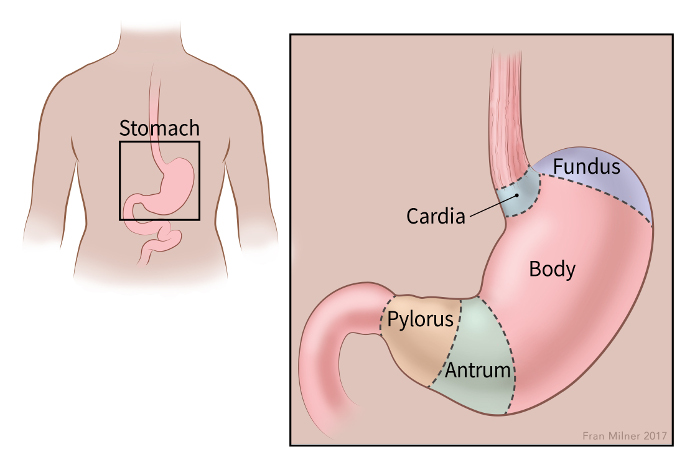
There are two main stomach cancer types. Intestinal and diffuse. Intestinal adenocarcinomas occur in the inner layers of the stomach wall and do not spread to lymph nodes and other organs. Diffuse adenocarcinomas are less common and tend to spread more rapidly. Although these types of cancer are less aggressive, they can be fatal if left untreated. The symptoms of stomach cancer can vary greatly depending on the type of disease and its stage.
Intestinal adenocarcinoma. This type of cancer grows into the outer layer of muscle and connective tissue in the stomach. It does not invade the peritoneal lining or serosa. It has spread to three to six lymph nodes and may have spread to other organs. It is often associated with a family history of the disease and may be harder to treat than the other types of cancer.
Small cell carcinoma. This type of stomach cancer does not spread to lymph nodes and is considered early. However, in more advanced cases, this cancer has spread to at least one lymph node. Inflammation of the stomach lining is a sign that the cancer has advanced. T1 is the most common type. If you notice any of these symptoms, contact your doctor immediately. This is an important step to take as it may be a sign of a more serious condition.
Adenocarcinomas. These types of stomach cancer are 90%-95% lethal. These cancers begin in the secretory cells of the stomach. These cells produce mucus and other fluids. People with family history of this disease are at an increased risk of developing the disease. In addition to family history, certain lifestyle factors such as smoking and diet also increase the risk of adenocarcinomas. It is a common form of adenocarcinomas and usually develops in men over the age of 40.
Adenocarcinomas are the most common types of stomach cancer. These types of stomach cancer start in the glands that secrete stomach acid and gastric juice. Tumors can be adenocarcinomas or adenomas, and they have many risk factors. Some of these risk factors may include a family history of gastrointestinal cancer or adenocarcinoma. They may also be asymptomatic.
Adenocarcinomas are the most common types of stomach cancer. Adenocarcinomas are adenomas in the lining of the stomach. They are rare but can be fatal. They can occur in men who have a history of certain genes. They are not uncommon in women. Adenocarcinomas are the most commonly diagnosed types of stomach cancer. They can affect a person’s overall health and quality of life.
In people with stomach cancer, tumors have spread to connective tissue and lymph nodes outside the stomach. This type of cancer has spread to the lining of the abdomen, while other types have spread to the outer muscle layer. In this type of cancer, the cancer has spread to the peritoneal mucosa or serosa. If the cancer has spread to the lymph nodes, it has spread to distant parts of the body.
The most common stomach cancer is adenocarcinoma. Adenocarcinomas are cancers of the stomach lining. Intestinal adenocarcinomas are cancers that have spread to the lymph nodes. Intestinal adenocartia is more common in people of Asian or Pacific origin. Some cancers can also be sporadic, meaning they don’t spread widely in the body.
Fortunately, most types of stomach cancer begin in the inner layer of the stomach wall. Mucosal cancer cells are not easily damaged by the immune system. It is advisable to consult a gastroenterologist if you suspect that you have stomach adenocarcinoma. In some cases, the condition may be asymptomatic or accompanied by other symptoms. Site bansm.or.id says that if you feel an upset stomach, a gastroenterologist may recommend that you seek treatment.
Some types of stomach cancer are asymptomatic. They may be characterized by persistent fever, weight loss, or chronic diarrhea. Most of these types of stomach cancer are highly treatable, but many patients don’t even know they have it. A doctor can detect the disease through a physical examination and biopsy. There are also several types of tumors in the intestine that are difficult to detect. When a person has cancer in the intestine, the disease will not be obvious.